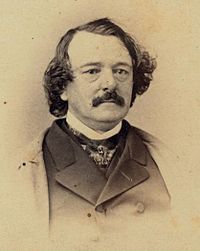User:Paramandyr/Henry Taylor Blow
Henry Taylor Blow | |
|---|---|
 | |
| Member of the U.S. House of Representatives from Missouri's 2nd district | |
| In office March 4, 1863 – March 3, 1867 | |
| Preceded by | James S. Rollins |
| Succeeded by | Carman A. Newcomb |
| Personal details | |
| Born | July 15, 1817 Southampton County, Virginia, USA |
| Died | September 11, 1875 (aged 58) Saratoga, New York, USA |
| Political party | Unconditional Unionist, Republican |
| Spouse | Minerva Grimsley Blow |
| Profession | Politician, Businessman |
Henry Taylor Blow (July 15, 1817 – September 11, 1875) was a two-term U.S. Representative from Missouri and an ambassador to both Venezuela and Brazil.
Early life
[edit]Henry was born in Southampton County, Virginia to Captain Peter and Elizabeth (Taylor) Blow, owners of the famous slave Dred Scott.[1] He moved with his parents to Huntsville, Alabama, where his father unsuccessfully tried farming.[1] In 1830 the family moved again to St. Louis, Missouri, where Peter Blow opened a boarding house, as well as hiring out his slaves, including Dred Scott, who worked as a roustabout.[1] Henry's mother died in 1831, followed by his father the next year.[1]
Henry Blow graduated from Saint Louis University[2] and started apprenticing in a law office, but was forced by the deaths of his parents to become a clerk in his brother-in-law Charless' business, selling paint and oil.[3] His acumen for business was so industrious that by 1838 he was a partner in Charless, Blow and Company.[3] He married Minerva Grimsley (1821–1875), daughter of wealthy saddle manufacturer, Colonel Thornton and Susan (Stark) Grimsley,[1] by whom he had eight children. One of them, Susan Elizabeth Blow, became a noted nineteenth century educator.[4]
Political life
[edit]Henry Taylor Blow was a member of the Missouri Senate and served from 1854 to 1858. He was strictly against the Dred Scott Decision in 1857, siding with his family's former slave, Dred Scott, in Scott's quest for freedom. Henry Blow manumitted the four Scotts on May 26, 1857, less than three months after the Supreme Court ruling.[5] A Union supporter during the American Civil War,[6] Blow was appointed Minister to Venezuela in 1861 by President Abraham Lincoln, and served until the following year.[3] He was then elected to the United States House of Representatives[3] as an Unconditional Unionist. He was reelected as a Republican, serving until 1867. Blow served on the Joint Committee on Reconstruction, which drafted the Fourteenth Amendment to the United States Constitution. He chose not to run for reelection in 1866.
Retirement from Politics
[edit]Blow resumed his business interests, but in 1869 was appointed Minister to Brazil[4] by President Ulysses S. Grant, serving one year. In 1874, he became one of the original members of the Washington, D.C, Board of Commissioners, again serving for a year.
Henry Taylor Blow died in 1875 at age 58 in Saratoga, New York. He was interred in Bellefontaine Cemetery in St. Louis, Missouri, and was survived by six of his children.
Blow Street, which passes through several south St. Louis city neighborhoods, is named for Blow. [7]
References
[edit]- ^ a b c d e Charles Van Ravenswaay, St. Louis: An Informal History of the City and Its People, 1764-1865, (Missouri Historical Society Press, 1991), 406.
- ^ John Thomas Scharf, History of Saint Louis City and County: From the Earliest Periods to the Present Day, Volume 1, (Louis H. Everts & Co., 1883), 608.
- ^ a b c d Walter Ehrlich, They Have No Rights, (Applewood Books, 2007), 10-11.
- ^ a b Susan E. Blow, Kathleen G. Winterman, Encyclopedia of Educational Reform and Dissent, Vol. 1, (SAGE Publications Inc., 2010), 109.
- ^ Charles Van Ravenswaay, St. Louis: An Informal History of the City and Its People, 1764-1865, 411.
- ^ Charles Van Ravenswaay, St. Louis: An Informal History of the City and Its People, 1764-1865, 408.
- ^ http://www.slpl.lib.mo.us/libsrc/b-street.htm
